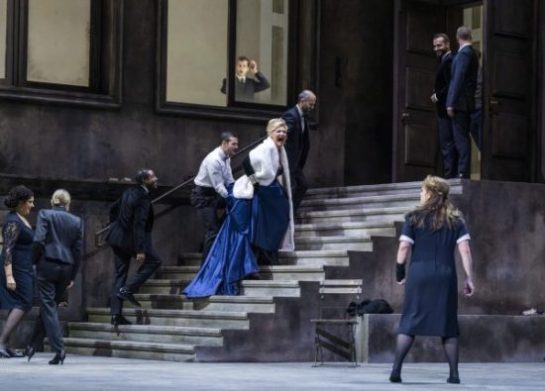 United Kingdom Richard Strauss, Elektra: Soloists, Chorus and Orchestra of the Royal Opera House / Sir Antonio Pappano (conductor). Royal Opera House, Covent Garden, London, 15.1.2024. (JR)
United Kingdom Richard Strauss, Elektra: Soloists, Chorus and Orchestra of the Royal Opera House / Sir Antonio Pappano (conductor). Royal Opera House, Covent Garden, London, 15.1.2024. (JR)

Production:
Director – Christof Loy
Set – Johannes Leiacker
Lighting designer – Olaf Winter
Costumes – Heidi Hackl
Lighting – Jürgen Hoffmann
Chorus director – William Spaulding
Cast:
Klytämnestra – Karita Mattila
Elektra – Ausrine Stundyte
Chrysothemis – Sara Jakubiak
Ägisth – Michael Workman
Orest – Łukasz Goliński
Orest’s companion – Michael Mofidian
Overseer- Lee Bisset
First maid – Noa Beinart
Second maid – Veena Akama-Makia
Third maid – Gabrielė Kupšytė
Fourth maid – Ella Taylor
Fifth maid – Valentina Puskás
Confidante – Marianne Cotterill
Trainbearer –Amanda Baldwin
Young servant – Michael Gibson
Old servant – Jeremy White
There were a number of reasons why this particular performance (the second in a run of six) underwhelmed and failed to pack a punch. Reports from the dress rehearsal were encouraging, but the critics at the opening night all commented on Nina Stemme’s struggle with the top notes. Is her voice now ‘battle-worn’ as one critic put it last year after her Wigmore Hall recital? If Stemme returns after her indisposition, we shall see and hear.
All credit to Lithuanian soprano Ausrine Stundyte for making her debut at Covent Garden by stepping in for this performance at very short notice. Luckily Stundyte had walked through the production when Stemme injured her wrist in December. Stundyte is no stranger to the role, having sung it in Vienna, Salzburg, Hamburg and Antwerp. (Also about a year ago she sang Elektra for Pappano in Rome, and you can read a review of the concert here which also gives some of the story of Strauss’s opera.) However, Stundyte’s Elektra is quite different to Stemme’s, more Tosca which Stundyte sings at Covent Garden for the first time next month. Her interpretation is more fragile, she has less volume than Stemme in full cry, but gives the character more tenderness and vulnerability and there is no doubting Stundyte’s ability to hit the top notes. Though if you like your Elektra bloodcurdling, thrilling and deafening, then this is not the production nor – for the most part – the singers for you.
Antonio Pappano seemed to be keeping his vast orchestral forces at bay to compensate, perhaps, for Stundyte; or is his view of the work less modernistic, preferring to concentrate on the many tender passages. Christof Loy, in the programme notes, stresses his view of the opera as more about love than blood-thirsty revenge and savage death. Certainly, the recognition scene and the bonding between the two sisters was most affectionate and affecting.
Having to place some of the larger, noisier percussion in some stalls boxes does not help with the acoustics; I felt the timpanist was rather reticent and trod cautiously throughout.
Karita Mattila looked the part in a blue ball gown, jewel-bedecked. Hers was not the most venomous portrayal of Klytämnestra (Christa Ludwig came to mind), but certainly one of the most visually glamorous. Vocally, Mattila’s lower register retains its creaminess. Her guests in the mansion were members of Vienna’s high society, her servants were parlour maids.
The vocal star of the night was, without doubt, American soprano (of German and Polish descent) Sara Jakubiak as Chrysothemis. To be fair, Richard Strauss gives this role the most attractive melodic lines in an otherwise bleak, unrewarding, demanding score.
I was also mightily impressed by Polish bass-baritone Łukasz Goliński’s rich, sonorous bass as Orest – his ‘wir habe einen Auftrag’ was chilling.
Minor roles were all satisfactory, but none really caught the ear. Clear German diction was variable across the board; with the exception of Jakubiak.

Johannes Leiacker’s set was dull, probably deliberately so. We are in Vienna, at the time of composition of the opera, so around 1910. The set depicts the dark and grubby tradesman’s back steps of a mansion on the Ringstrasse, only a lit upper corridor giving the hint of a party up above. No rivers of blood, no hints of any sacrifices, even the attempted rape by a member of the haute volée of a maidservant seemed hesitant.
The orchestra played with distinction, fittingly as this is Pappano’s last new production as Music Director of the Royal Opera before he moves to the London Symphony Orchestra.
Elektra should knock you back, stunned. This performance didn’t.
John Rhodes

Interesting, John, to have a view from someone who caught Stundyte instead of Stemme, as I did (at the third of the three she sang). Spectacular top notes we had (missing and missed by Stemme at the general rehearsal which I also saw). The marked difference was the intensity and range of colour, both of the musical line and the text which Stemme can still produce, as she did in the heart-wrenching solo in the recognition scene, which brought me close to tears as it mostly does. For all her efforts, Stundyte failed to do that, as she also did in the Italian concert (surprisingly available from the extensive Rai 5 catalogue). The Loy production packed a much greater punch with Stemme despite the vocal failings and I am sorry not to have been able to catch one of the last two performances, which she did sing. There was no indication that any of the performances was recorded for DVD. It will be broadcast on BBC Radio 3 next month, with Stundyte.